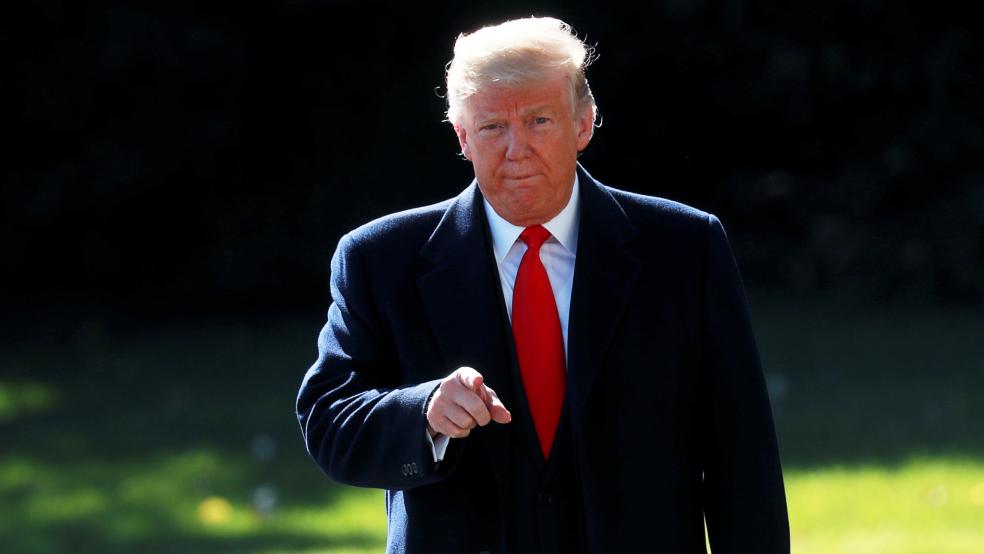The GOP tax cuts have turned out to be far less popular than Republicans expected, but President Donald Trump is nevertheless tripling down on the idea that tax cuts can deliver an election win for Republicans.
Speaking to reporters on Saturday after a rally in Nevada, Trump said his administration and congressional Republicans are working on “a very major tax cut for middle-income people” to be unveiled sometime around the beginning of November, or just before.
“We are going to be putting in, and are studying very deeply right now, around the clock, a major tax cut for middle income people,” he said. “Not for business at all. For middle-income people.”
Trump clarified those remarks, sort of, on Monday. “We're giving a middle-income tax reduction of about 10 percent," he said, according to Fox News. "That's on top of the tax decrease we've already done." Trump added that a “resolution” would be introduced in the next two weeks, and that any vote would come “after the election.”
What plan is Trump talking about? Nobody seems to know for sure.
Trump said House Ways and Means Chairman Kevin Brady (R-TX) and House Speaker Paul Ryan (R-WI) were working on the new plan, and The Washington Post, citing an official familiar with the discussions, said that “Trump has pushed congressional leaders to introduce another tax cut package before the Nov. 6 election.”
Treasury Secretary Steven Mnuchin told The New York Times Sunday that he’s been working with Brady on a plan “specifically focused on the middle class” that would be released “shortly.” Mnuchin indicated that the proposal was different than the “Tax Reform 2.0” package passed by the House last month, which included an extension of the individual tax cuts set to expire after 2025. That legislation went nowhere in the Senate. “This would be different than what the House had already passed,” Mnuchin told the Times. “It’s in addition, it’s not instead of.”
But the Treasury secretary provided no additional details about the plan, and Trump’s comments reportedly caught top GOP lawmakers off guard. “Republican tax policy-makers know nothing about it,” Bloomberg News reported. And an unnamed Republican tax lobbyist with ties to GOP leadership told Bloomberg that he recently met with White House officials and came away believing that no additional effort at tax legislation was imminent.
Brian Gardner, an analyst with Keefe, Bruyette & Woods, a boutique investment bank, speculated that Trump may have been hinting at a proposal floated by the administration over the summer: to allow gains from investments to be adjusted for inflation. “While indexing capital gains for inflation might not meet many people's definition of a ‘middle class tax cut,’” the analyst wrote, “it is an idea that National Economic Council Director Larry Kudlow supports and has pushed for many years.”
Would more tax cuts again add to the deficit? Mnuchin told the Times that the fiscal impact of any additional tax cuts was being considered. “That could mean that the administration would seek to offset the tax cuts with spending cuts, or by raising taxes on other groups of taxpayers,” the Times’ Alan Rappeport and Jim Tankersley write. But concerns about the ballooning deficit could build resistance to any further tax cuts among some Republicans. Sen. Thom Tillis (R-NC) said Sunday that any new cuts shouldn’t add to the national debt once economic feedback effects are factored in — a caveat that could leave GOP supporters wiggle room to once again argue that the tax cuts will pay for themselves. "We’ve got to make sure that it’s at least supported by facts around dynamic growth," Tillis said on NBC's "Meet the Press. “It has to pay for itself. We can’t go further in debt.” Tillis also argued that the tax cuts passed late last year will pay for themselves over time. There is no evidence thus far that the tax cuts are paying for themselves.
Does another tax cut have a chance of passing? No, at least not in the timeframe Trump initially indicated. Congress is out of session until November 13, a week after the midterm elections, and there’s no chance that it will take up new tax legislation before then. “So the move appears to be an effort to give Republican voters a jolt of enthusiasm as the polls are opening — and perhaps an acknowledgment of how small a boost Mr. Trump’s signature tax bill seems to be giving Republicans in the battle to control Congress,” The New York Times said. Passing an as-yet unspecified tax package in the lame duck session after the election is also highly unlikely.
So what happens now? Politico’s Ben White laid out one scenario: “Republicans could hope Trump’s comment just fades away in all the noise. But that would look very strange. So perhaps the White House will come out with some kind of outline of a middle class tax cut plan paid for with unlikely-to-ever-happen spending cuts as a campaign season document to tout in the final days. That would allow Trump to do rallies and promises to cut everyone’s taxes if the GOP holds onto Congress.”





